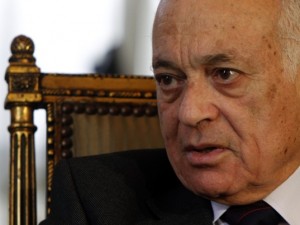
Egypt on Monday urged the Syrian regime of President Bashar al-Assad to enact reforms to satisfy pro-democracy protesters as violence there saw another 15 people killed, according to activists.
“We hope that the Syrians in a peaceful manner resolve their problems,” Egyptian Foreign Minister Nabil al-Arabi told reporters during a trip to India. “Whatever reforms the people would like, it should be looked at in a positive manner,” he added.
Arabi explained how the so-called “Arab Spring” — pro-democracy movements in North Africa and the Middle East that have challenged autocratic regimes — had changed the expectations of people across the region.
“A wind of change has blown in the Arab world,” he said. “We have already seen changes in the region and there’ll be changes in other countries… it could differ, but change is where people can live in democracy, with good governance, the rule of law and be able to express themselves freely.”
The United Nations on Monday condemned the “shocking” brutality of Assad’s regime as activists said at least 15 people were killed in the latest crackdown on protesters.
Asked about Yemen, where clashes between forces loyal to President Ali Abdullah Saleh and protesters were reported to have claimed another 20 lives on Monday, Arabi said efforts at reconciliation were under way.
On Libya, he stressed that Egypt was taking no part in the NATO-led military action against the forces of embattled leader Moamer Kadhafi, adding that his country was “against the use of force.”
“What we would like to see is a peaceful resolution of the situation,” he added.
A military council took power in Egypt when veteran leader Hosni Mubarak quit on February 11 following 18 days of nationwide anti-government protests.
The country is set to hold its first parliamentary election since Mubarak’s overthrow in September and then prepare a constitution before a presidential poll.
Arabi also stressed the need for peace in the Middle East and the resolution of the Israeli-Palestinian conflict.
“The international community is happy to see a peace process going or not going,” he said. “Something different has to come now. The international community has to look at the need to end the conflict.”

Leave a Reply
You must be logged in to post a comment.